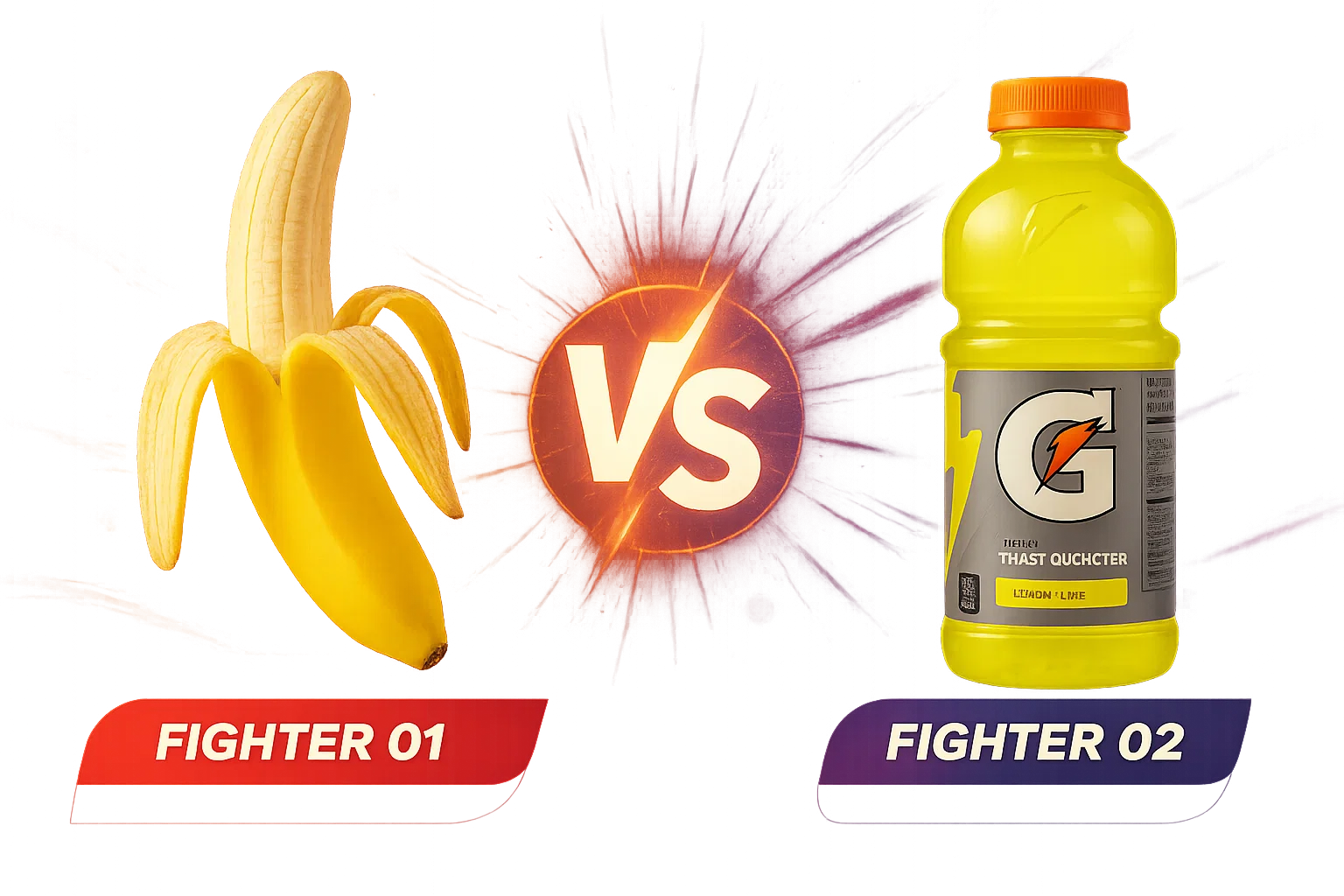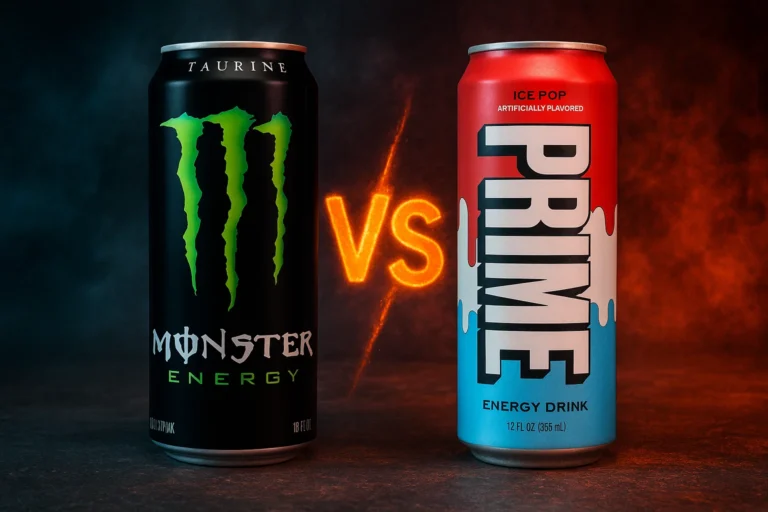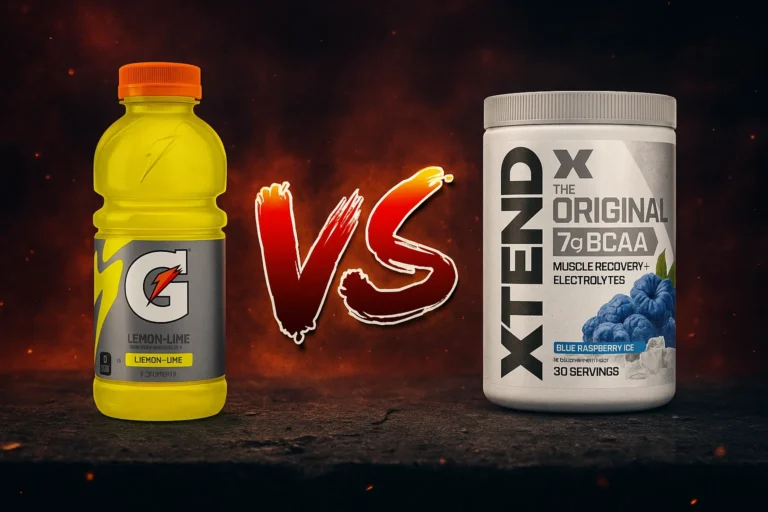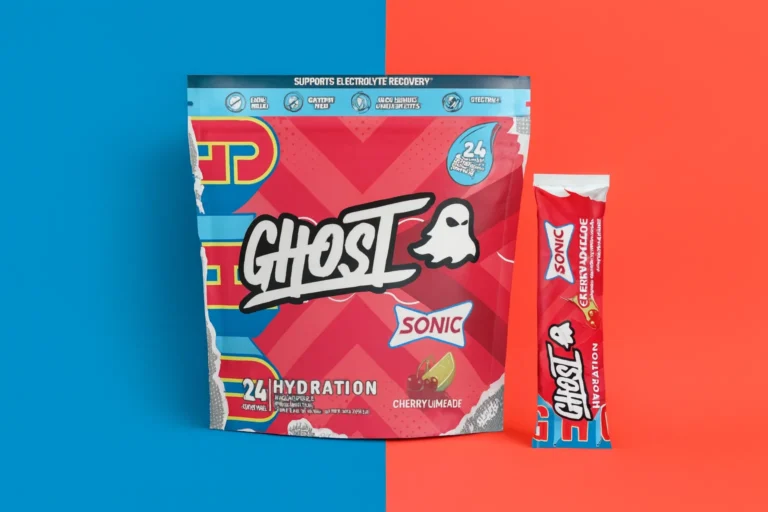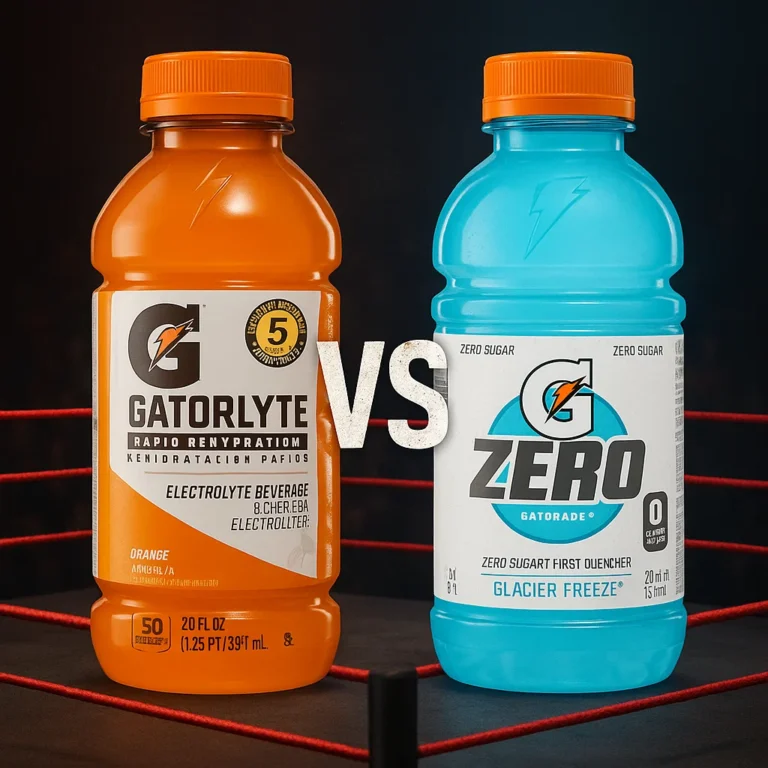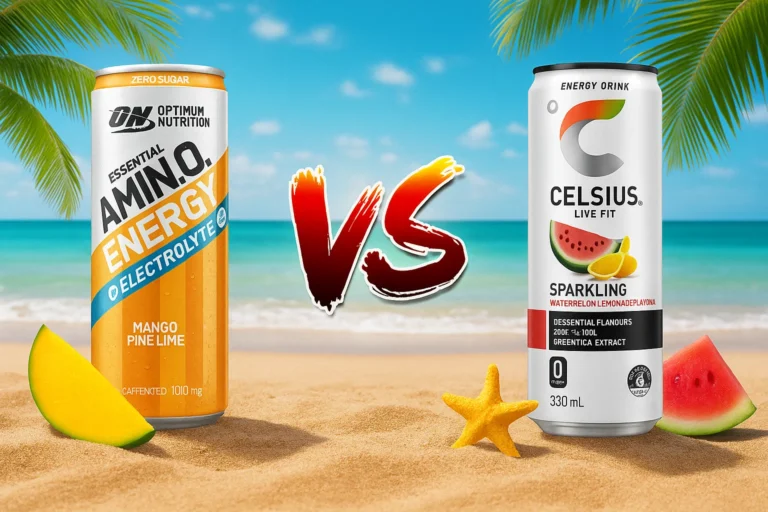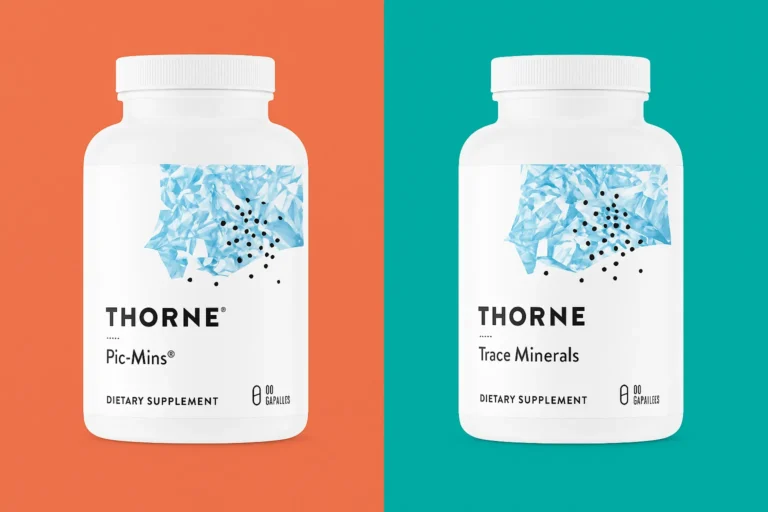Potassium in Gatorade vs Banana: Quick Comparison
When it comes to post-workout recovery, Gatorade vs banana is a common debate among fitness enthusiasts. Both are popular for replenishing energy and electrolytes, but how do they stack up when you compare key nutrients like potassium, sodium, sugar, and calories?
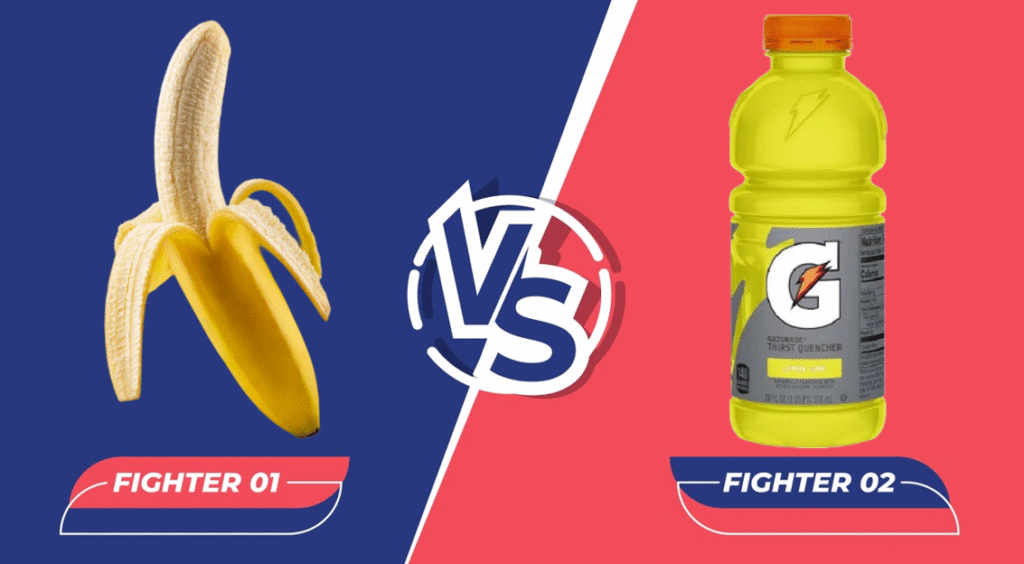
In this article, we’ll explore the potassium in Gatorade vs banana, along with a full nutritional comparison, to help you choose the best option for hydration, muscle recovery, and fitness goals.
Table of Contents
Banana Nutrition Facts (per 100g)
Bananas are a natural, nutrient-rich snack that supports energy, hydration, and muscle recovery especially due to their high potassium content and clean nutrient profile.
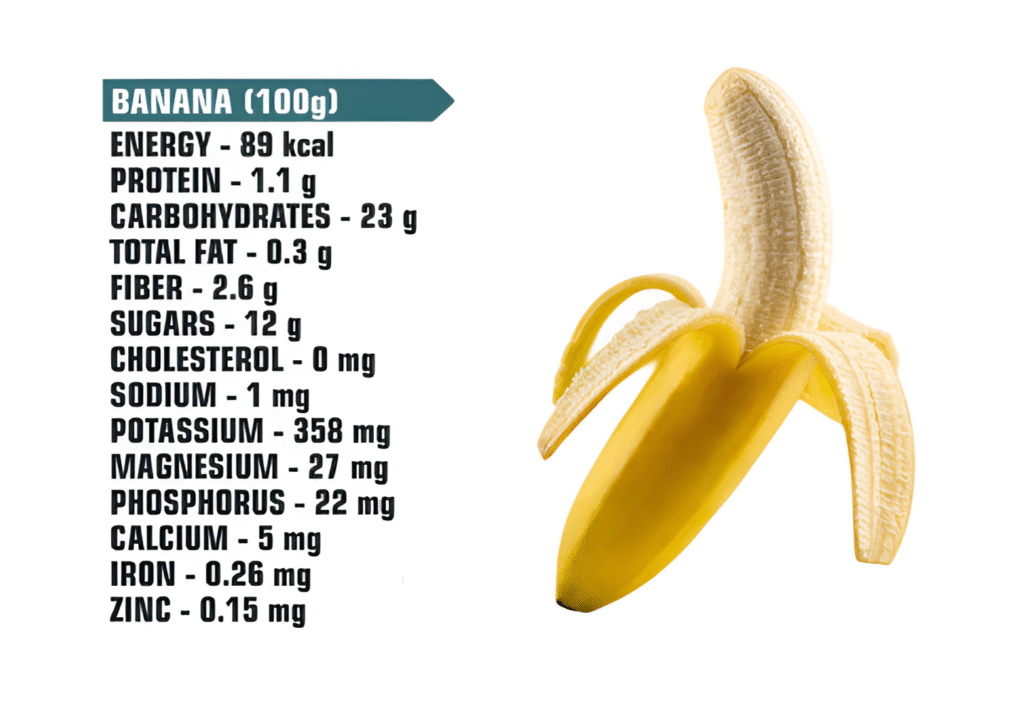
- Potassium: ~358 mg – A rich source of potassium; helps prevent cramps and supports healthy muscle function.
- Sodium: ~1 mg – Extremely low; not suitable for sodium replenishment after heavy sweating.
- Calories: ~89 kcal – Low in calories and ideal for weight management and post-exercise refueling.
- Total Sugars: ~12 g (natural) – Provides gradual-release energy without added sugars.
- Carbohydrates: ~23 g – Supplies sustained energy for workouts and recovery periods.
- Protein: ~1.1 g – A small amount that contributes to muscle maintenance.
- Other nutrients: Vitamin B6, Vitamin C, fiber, and antioxidants – Supports immunity, digestion, and overall recovery.
A 100g portion of banana is a balanced and efficient post-workout snack, especially effective for potassium replenishment and natural energy without added ingredients or excessive calories.
Gatorade Nutrition Facts
Gatorade is a sports drink built for hydration, designed to quickly replace fluids, electrolytes, and energy lost during intense physical activity.
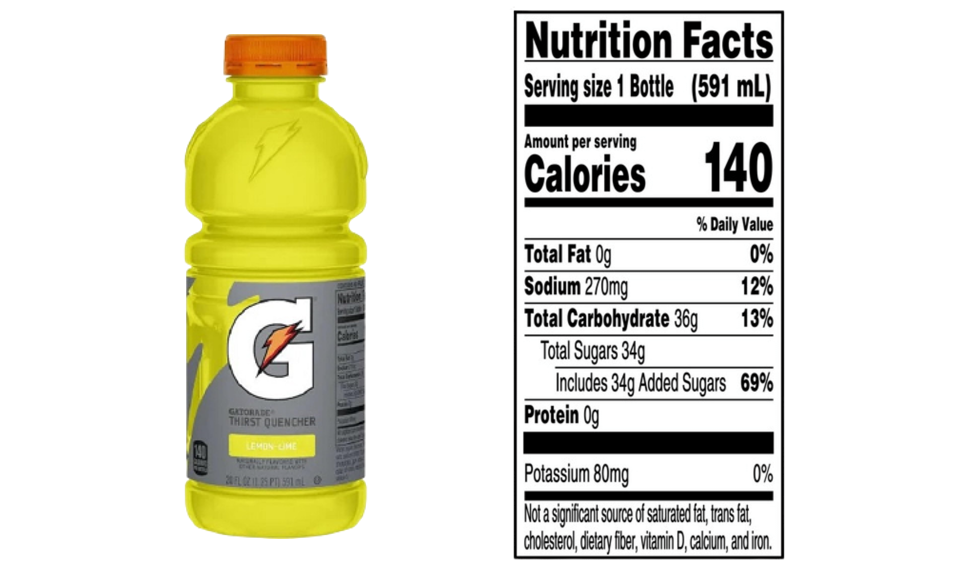
Each 20 oz bottle of standard Gatorade contains:
- Potassium: ~75 mg – A small dose; far below daily needs and not ideal for serious potassium replenishment.
- Sodium: ~270 mg – A high amount; helps restore electrolytes lost through heavy sweating.
- Calories: ~140 – Moderate calorie count, mostly from sugar; can add up if not burned off through exercise.
- Total Sugars: ~34 g (added sugar) – High sugar content; provides quick energy but may cause spikes and crashes.
- Carbohydrates: ~36 g – Mostly fast-digesting sugars for immediate fuel during prolonged exercise.
- Protein: 0 g – No muscle-repair support; not designed for recovery nutrition.
- Other ingredients: artificial colors, flavors, and preservatives – Included for taste and appearance; not beneficial for health.
Gatorade works best for long-duration or high-intensity workouts where fast hydration and electrolyte replacement, especially sodium are needed.
Key Differences: Gatorade vs Banana
Both options serve different purposes, but here’s how they stack up side by side:
| Nutrient | Gatorade (20 oz) | Banana (medium) |
|---|---|---|
| Potassium | ~75 mg | ~358 mg |
| Sodium | ~270 mg | ~1 mg |
| Calories | ~140 | ~89 |
| Sugar | ~34 g (added sugar) | ~12 g (natural sugar) |
| Carbohydrates | ~36 g | ~23 g |
| Protein | 0 g | ~1.1 g |
| Ingredients | Artificial additives | 100% natural fruit |
Summary:
- Potassium: Bananas provide over 5x more potassium than Gatorade.
- Sodium: Gatorade has significantly more sodium, ideal for heavy sweating.
- Sugar: Gatorade contains more sugar, all added; bananas contain natural sugars only.
- Calories: Bananas are lower in calories and more nutrient-dense.
- Ingredients: Bananas are natural, while Gatorade includes synthetic additives.
Which One Should You Choose
Your choice depends on your workout type, fitness goal, and personal preferences.
✅ Choose Banana if:
- You’re focused on potassium intake and natural recovery
- You want to avoid added sugars and processed ingredients
- You’re doing strength training, light cardio, or general fitness
- You’re aiming for weight loss, clean eating, or whole-food nutrition
✅ Choose Gatorade if:
- You’re doing long-duration workouts like running or cycling
- You need to replace sodium and fluids lost through heavy sweating
- You need quick energy and electrolyte support in hot or humid conditions
Final Verdict: Banana Wins for Potassium, Gatorade Wins for Intense Hydration
When comparing Gatorade vs banana, it’s clear that both have their place—but for potassium support, muscle function, and recovery, the banana is the better all-around choice. It’s higher in potassium, free from added sugar, and offers natural nutrients your body needs post-exercise.
Gatorade is most effective in specific situations, like endurance training or extreme heat, where sodium loss and rapid hydration are the priority. But for most everyday workouts, a banana is the smarter, healthier, and more potassium-rich option.
FAQ: Banana vs Gatorade
1. Which has more potassium, Gatorade or banana?
Bananas have much more potassium (~420–450 mg) than Gatorade (~75 mg).
2. Which is better for post-workout recovery, Gatorade or banana?
Gatorade is good for hydration and sodium replacement, but bananas are better for potassium and muscle recovery.
3. Does Gatorade or a banana have more sugar?
Gatorade has about 34g of added sugar, while a banana has only 14g of natural sugar.
4. Which is lower in calories, Gatorade or a banana?
A banana has about 105 calories, while Gatorade has 140 calories per 20 oz.
5. Can Gatorade help with muscle cramps?
Gatorade can help with hydration, but bananas are better for preventing cramps due to their higher potassium content.
6. Which is better for weight loss, Gatorade or banana?
Bananas are better for weight loss as they are lower in calories and provide more nutrients per serving.
7. Which hydrates better, Gatorade or banana?
Gotorade is designed for fast hydration, especially in endurance sports, while a banana supports hydration with natural sugars and potassium.

With a Bachelor’s in Biology and Health and a Master’s degree in Quality Control of Foods and Drugs, I review dietary supplements using scientific analysis, ingredient verification, and safety standards to provide transparent and reliable recommendations.

